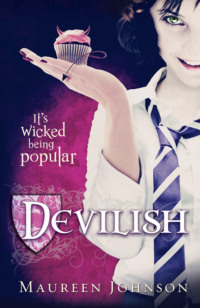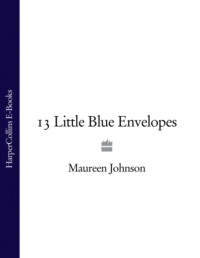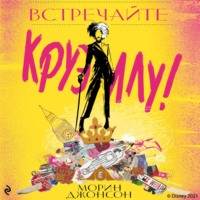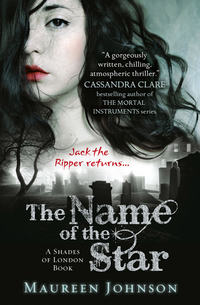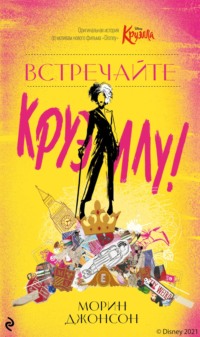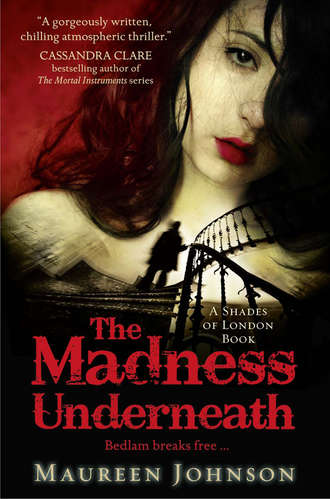
Полная версия
The Madness Underneath
“You’re back!” she said. “You’re back, you’re back, you’re back . . .”
And I was.


Come downstairs -s
I blinked.
Stephen? I wrote back.
The reply, a few seconds later: Yes. Wear shoes.
I knelt on my bed and looked out the window, but I couldn’t see anyone. Just the empty square, the empty sidewalk. Empty London, all tucked in for the night. This emptiness didn’t fill me with confidence. I was in no mood for weird text messages telling me to go outside in the middle of the night, especially when I couldn’t see anyone outside the window.
This didn’t mean I wasn’t going, of course. Because, Stephen.
I got up as silently as I could, grabbed my sneakers from the foot of my bed, plucked my fleece from the hook by my door, and crept out, closing the door quietly behind me. Jazza didn’t stir at all. Downstairs, the hall lights were on, even though no one was around. They used to be off at night. Maybe this was part of the new security plan—always look awake, always look at home, always keep the public areas lit. There was no noise from Claudia’s room as I passed by. I remembered the alarm as I stood by the front door. If I tried to get out, it would go off. Stephen was nodding at me. He held up his thumb in a thumbs-up gesture. I smiled and thumbs-upped back. Then he shook his head no and typed something into his phone.
Open the door.
I can’t open the door, I typed. Alarm go boom.
He shook his head again and typed another message.
Just open it.
I took a deep breath and pushed. The door opened with no fanfare, no screech and flash, no metal bars slamming down. I stepped into the cold night. A great plume of my breath fogged up in front of my face.
I was used to seeing Stephen in his police uniform, but today he was wearing a black sweater and a pair of jeans. He had a scarf thickly knotted around his neck in the way that all English people seemed to tie their scarves (a tie that eluded me no matter how I tried). And although it was very cold, he wore no coat. I think some English people think coats are for the weak.
I’d forgotten just how tall he was, and how worried he always looked. He had very thin and straight black eyebrows that were perpetually pushed slightly toward his nose in a worry wrinkle, like he’d just been told something mildly problematic—not terrible or tragic, just annoying and difficult to fix. He turned this vaguely troubled gaze on me, the newest and most immediate problem.
“Hey,” I said. “You heard I was back, huh?”
My relationship with Stephen had been a strange one from the start. He wasn’t, for many reasons, the most open person. But he was here. I think I’d known he would come. My initial inclination was to grab him around his long, skinny middle and hug him until his head popped off, but Stephen was not really a hugger.
I decided to hug him anyway. He tolerated this reasonably well, though he didn’t reciprocate. I guess I expected a smile or something, but smiling also wasn’t his thing.
“Your roommate,” he replied. “Julianne. Is she asleep? Your lights have been off for a half an hour.”
Nor was conversation, really.
“You’ve been looking at my window for a half an hour?”
“That’s not an answer to my question.”
“She’s asleep,” I said. “At least, she’s quiet. She didn’t say anything when I got up.”
“Would she normally say something?”
“It’s good to see you too,” I said. “They said that’s a really good security system, but not so much, huh?”
“It is quite a good system.”
“So why didn’t it go off?”
“Disarming the alarm system of a school building isn’t exactly the trickiest thing the security services has ever had to do.”
“Security services . . .”
“We should move.”
“What?”
“Come on.”
“But . . .”
He had already slipped a businesslike arm across my back and was ushering me down the cobblestone path and around the corner. Stephen was the only person in the world I would tolerate this kind of thing from, because there was one thing I did know—if he dragged me out of bed and ushered me through the dark, there was a reason. And I would be safe.
There was a red car, and I heard the doors unlock when Stephen pointed the remote at it.
“That’s not a police car,” I said, pointing out the obvious.
“It’s an unmarked vehicle. Get in.”
“Where are we going?”
“Let me explain inside the car.”
There was a figure sitting in the front passenger seat. I recognized the head of white hair at once, and the altogether too young face that went with it. It was Mr. Thorpe, the government official who’d come to visit me in the hospital. The one who told me I was never allowed to say anything.
“What’s he—”
“It’s all right,” Stephen said, opening the back door for me. “Get inside.”
Stephen held the door open until I acquiesced.
“Aurora,” Mr. Thorpe said, turning around. “Good to see you. Sorry to pull you out in the middle of the night like this.”
“What are we doing?” I asked.
“We need to talk.”
Stephen started up the car.
“Where are we going?” I asked.
“Do you enjoy being back?” Thorpe asked.
Thorpe didn’t exactly seem like the kind of person who cared whether or not I was adjusting well to my circumstances, and Stephen was suddenly very focused on his driving.
“It’s okay,” I said. “I just got here. As I guess you know.”
“We do.”
“Why do I feel like my being back has something to do with you?”
“It does have something to do with us,” he said. “But I hope that you’re happy about it.”
“Where are we going?”
“We’re just going to take a short ride,” Thorpe said. “Nothing to be worried about.”
Stephen looked at me through the rearview mirror and gave me a reassuring nod. I wrapped my arms around myself and shivered. He turned up the heat.
The first few turns, I knew basically where we were—in the Wexford neighborhood, going south. Then we were lost in a warren of tight little streets for a few moments, reemerging near King William Street, where the old squad headquarters was, where we’d faced down the Ripper. We turned off that quickly enough and were on a road that ran along the Thames Embankment. We were definitely heading west. West was the way to central London. The black cabs got more numerous, the path along the Thames thicker with trees and impressive buildings, the lights on the opposite bank shinier. I caught sight of the London Eye, glowing brightly in the dark, then we were going right, into the very heart of London.
We pulled up into the circular drive of what I first thought was a hotel. It was a moment before I noticed the sign for the Tube, the distinctive red circle with the blue bar across it. We were at Charing Cross station. Stephen pulled the car up right in front of the doors. Thorpe got out at once, and Stephen released me from the back.
“Come in,” Thorpe called. “This way. Come inside.”
There was a female police officer standing by one of the front doors. She pushed it open as we approached. She moved fast, like she’d been waiting for us and her most important job of the night was to open that door.
Charing Cross was a large central hub for both trains and subways. It had a large central area full of shops and ticket counters, with a glass roof crisscrossed with metal latticework. A woman in a black suit waited for us in the middle of the concourse.
“The CCTV is off?” Thorpe asked her quietly.
The woman nodded.
“Stay in the control room. No one comes down.”
I gave Stephen a what-the-hell-is-this look, and he responded with a it’s-fine-no-really-it’s-fine stare.
“We’re just going to go down to the platforms,” Thorpe said. “This way.”
He began walking toward the opening marked UNDERGROUND. We followed him down the steps. Gates had been opened, allowing us to proceed. Charing Cross Tube station was a somewhat grim place, with brown tiles on the floor and tiled walls done in variations of brown; the ticket machine walls were an alarming electric lime green. The escalators were shut off, so we had to walk down to the platforms, Stephen in front of me and Thorpe just behind. It was unnerving to be in a Tube station after hours. There was no body heat from the thousands of people who usually rushed around, no sound of musicians playing or talking or laughing or trains roaring along. Every one of our footsteps on the slated metal steps was clearly audible as we descended.
“Bakerloo?” Thorpe asked.
Stephen nodded.
I looked up at the sign, with the brown lettering that indicated the Bakerloo line. The Bakerloo line at Charing Cross . . . that meant something to me. But it wasn’t until we got down to the platform that the significance became clear.
“Do you see someone?” Thorpe asked me.
At the far end of the platform was a woman. Her hair was a silver-blond, swept back in heavy wings. She wore a black cowl-neck sweater and a gray skirt—ordinary enough clothes. I think the shoes told me she was from a different era. They were just a bit too chunky, too platform. She stood right at the edge of the platform, her gaze fixed on the opposite wall. The last time I’d spoken to this woman, all she could say was “I jumped” over and over in a brittle whisper. She was vulnerable and pale and, frankly, depressing to be around. Just getting near her made my spirits sink.
“The woman,” I said, glancing at Stephen. “I’ve met her before.”
Thorpe nodded to Stephen, who gently cleared his throat.
“Let’s go and talk to her,” Stephen said.
“Why?” I whispered. “What are we doing here?”
“Something important, I promise. I wouldn’t have brought you here otherwise. I just need you to talk to this woman.”
I looked down the length of the empty platform, where the woman stood by the gaping maw of the silent tunnel. She had turned toward us, expectant. Stephen started to walk toward her, slowly, allowing me to follow. The woman could do me no harm—I knew that. I wasn’t frightened of her. It was more that she was so obviously sad—beyond sad, to some terrible point of existence. She was a palette of grays, and I didn’t want to get anywhere near her.
“It’s you,” she said when we reached her.
“Yes,” Stephen replied. “I was here a few days ago.”
“You came back. You brought her.”
“I did, yes. Rory, this is Diane.”
“Hello,” I said. I kept a foot or two behind Stephen, eyeing the woman.
“He said you would help me.” There was desperation in Diane’s eyes. “Will you help me?”
“Help you what?” I said.
“Make it stop. He said you could make it stop.”
At first, I refused to accept what I’d just heard. It made me vaguely sick. Stephen wouldn’t have brought me down here for that. Stephen didn’t even know I could do that . . .
“You don’t have to do it if you don’t want to,” Stephen said. “But she’s suffering.”
Except he clearly did know.
“Please,” Diane said again. “Please. Please. I can’t go on like this. Please. Please. I never wanted to be here. I thought it would be quick. Jumping is quick. But I never went away. I jumped . . . but I never went away.”
I had used a terminus before, so it wasn’t that I was entirely opposed to the idea, in general. And if anyone needed a terminus, it was probably this poor woman, trapped on a train platform for thirty or forty years, constantly stuck in the place that she’d killed herself. This gray and sad woman . . .
And yet. I’d been brought here all cloak-and-dagger. Stephen knew things that he shouldn’t have known. Thorpe stood down at his end of the platform and watched the show. That’s what it felt like—a show. I stepped away from Diane a bit and waved Stephen closer. His chin was down toward his chest, and he couldn’t look directly at me.
“How did you know?” I said, low enough so that Thorpe couldn’t hear.
“I kept an eye on you in Bristol,” Stephen said quietly.
“An eye on me? You followed me? And didn’t say anything?”
“I wanted to make sure—”
“And you told Thorpe? You told this woman I’d fix things for her? You brought me here to test me or something?”
“You don’t have to do anything you don’t want to do,” he said, lifting his head a bit. “If you want, we walk away right now.”
“Oh, sure,” I said.
“I mean it. We leave right now if you say so.”
I looked back at Diane for just a moment, but I had to turn away. She was the embodiment of depression, of desperation. Releasing her would be fair. It would be right. I could come back and do it some other time, maybe. But not now. Not when I’d been brought here like this.
“Okay,” I said, drawing myself up as tall as I could. “We leave. Now.”
He blinked slowly.
“If that’s what you want.”
“That’s what I want.”
Stephen examined my face for a moment and rocked back and forth on his heels ever so slightly. We stood practically toe to toe, and I could smell the cold on his coat.
“Right,” he said.
Diane must have been listening, because she let out a wail. It was unpleasant to hear, so I blocked it out. I walked back down the platform toward Thorpe and left Stephen to try to talk to her. This was his fault. He’d made the promise. He could explain to her why it wasn’t going to happen.
“What’s going on?” Thorpe called.
“Nothing,” I replied. “I’m leaving.”
“Is it done?”
“Nope,” I said.
“Are you unable to . . . do what she asks?”
“I’m not—”
“Rory!” Stephen yelled.
This is when I felt something at my back. It felt like the wind—a cold and strong wind. There was a zing of electricity up my spine, and I couldn’t move, couldn’t talk.
It wasn’t unlike that feeling you get at the top of a roller coaster, just when you hear the clanking noise that pulled you up there stop, and something lets go, and you know the feeling is about to get much more intense and extreme. Everything goes up—your pulse, the blood to your head, even your organs seem to leap as it all falls away. The air comes into your lungs faster than you can process it, so you choke on it for a moment.
My ears filled with the sound of my own heartbeat, my blood being forced through my veins. The world went white. Then everything settled just as fast as it had stirred, and I could smell the smoky flower smell, and the world came back into focus.
I fell to my knees on the platform surface, just managing to keep myself from going headfirst over the edge by grabbing at it. Then I felt hands at my waist, holding me steady, pulling me back into a seated position.
“You’re all right,” Stephen said. “You’re all right. She came up behind you. She grabbed you. She was too fast. I couldn’t stop her.”
Thorpe hurried up to us.
“Did something happen?” he asked.
In reply, I got down on my knees on the bumpy yellow section at the very edge of the platform, leaned over the side, and began to throw up on the tracks. Someone—Stephen, I guessed—held me from behind to make sure I didn’t lose my balance. The sickness didn’t last long, and it cleared my head instantly. I pushed back and sat on my heels and wiped my mouth.
“I didn’t do it,” I said, once I caught my breath.
“What?” Thorpe asked.
“It happened,” Stephen said. “The woman touched Rory, not the other way around. That’s what she means.”
“But you are sure.”
“There’s no mistaking it,” Stephen said, a little sharply. “It’s not subtle.”
“Then get her back to her school and make sure she’s all right.”
“Come on,” Stephen said to me softly. “Can you stand?”
I didn’t answer, and when he tried to help me, I pushed his hands away and walked down the platform. I knew Stephen was a few steps behind me, quiet, nervous. I saw several mice dash along the edges of the corridors or along the steps as we approached, put out by our appearance. The Tube belonged to them at night.
I stood outside Charing Cross station for a minute, taking deep, heavy breaths of cold air. The policewoman watched me from a distance—impassive. She couldn’t have had any idea why I was here or what I’d just done. I was trying to figure out what I was feeling. It wasn’t anger, but it was something related to it. Was it exhaustion? Maybe even relief? It was all those feelings, maybe, and I didn’t feel like having any of them, so I decided to ignore them all and concentrate on breathing nice and slow.
Stephen exited the station a minute later. He went right to the car and held the passenger’s door open for me.
“Don’t we have to wait for Thorpe?” I asked. There was a bit of a growl in my voice, mostly from the vomiting. It made me sound very angry. I was fine with that.
“He can ride with the other officer. He said I should take you.”
I got into the car, and Stephen shut the door. He turned on the engine and turned the heat on full blast. Gusts of warm air roared out of the vents and directly into my face. I reached over and turned it down.
“I thought you might be cold,” he said.
“I am. It feels good. I just threw up.”
“She was too fast for me to stop her,” he said. “Sometimes they move quickly, more quickly than us. I couldn’t stop her.”
I’d seen it. I knew that was true. There was nothing he could have done to stop her if she’d been moving as fast as she really wanted to go. Ghosts are quick when they want to be.
Still, I wasn’t letting him off the hook that easy. I maintained a steely silence for a few moments.
“Be mad at me if you want,” he said. “But everything I’ve done has been for good reasons.”
“Like what?”
He took off his black glasses and rubbed them on his leg. His leg bounced a little with tension.
“Rory, I just . . . it’s . . . it’s very complicated.”
“Try me.”
“Rory . . .”
“What’s Thorpe doing?” I said. “Over there, by the door?”
Thorpe wasn’t over by the door. I’d just said that to distract him. I yanked the keys out of the ignition.
“Tell me,” I said, shoving them down my shirt and holding them against my chest. “Tell me, or we go nowhere. Tell me or I’ll start screaming. Do you want me to draw lots of attention to what’s going on here? I’ll totally do it.”
A deep sigh from Stephen. He banged his head gently against his headrest and stared up at the car ceiling.
“They were going to shut us down. They were happy with the results of the Ripper case, but without a terminus, they didn’t know how we could still function.”
“You still have one,” I said. “What about the one in the bathroom? The one Jo used on Newman?”
He reached into his pocket and removed a small plastic vial, then he switched on the interior light so I could look at it. It contained a gray stone.
“That’s it,” he said. “It’s gone cloudy, as you can see. It doesn’t work anymore. We’ve tried. It’s like a blown lightbulb.”
“What about the two in the river?” I asked. “Can you get them back? You can get things out of the Thames—guns and evidence and stuff, right?”
“Guns, maybe, on a good day. But not two extremely small stones. The Thames is a powerful tidal river. Presumably the stones drifted a bit before they sank, and now they’re mixed in somewhere in the millions of tons of sediment and sludge. So you are the only terminus. Then I saw what happened to you . . . I needed to show Thorpe that there was one terminus left. I also needed a good reason to bring you back. I was never comfortable with you being sent away like that, on your own, with no support. This solved both problems. We’ll be allowed to keep going for a while now that he’s seen.”
Stephen was right. I couldn’t have stayed there on my own, with no one to talk to. He reached over and took the vial and put it back in his pocket.
“And how did you do it?” I asked. “How did you bring me back?”
“Thorpe did that. I honestly don’t know how he set it up. I only know he made a very strong suggestion to your therapist that you should be returned to London. He didn’t give me any details.”
Of course. Now it all made sense. Julia’s sudden decision that I should return to Wexford. Her obvious lie about all the work I’d done in therapy.
“It was up to you,” Stephen said. “You were asked if you wanted to return. You said yes.”
“But I didn’t say I would just . . . put on some freak show for Thorpe, or blow up some woman. You could have told me where we were going.”
“I wasn’t sure if you’d agree to just . . . doing it. But I thought if you saw the pain Diane was in . . . it was appropriate use, Rory. She was in agony. Now, I’ve told you everything. Give me back the keys. Now.”
The keys were sweat-stuck to my chest. I knocked them loose and they fell gracefully into my crotch. I picked them up and handed them over. He started the car again and was putting it into reverse, then stopped.
“Boo and Callum,” he said, his voice smooth and quiet again. “They know you’re back. I can take you to see them now, and we can talk about it. If you want. We can go right now, or we can do it some other time. I don’t know how you’re feeling.”
The rapid change in emotions, the way he wasn’t looking at me . . . he was still feeling very guilty. His reasons may have been good, but he still felt bad about using me like that, about keeping things from me.
I did want to see Boo and Callum. Truth be told, I was still glad to see Stephen. And to tell even more truth, it was just a little bit fun to play with his guilt. And he did feel guilty. And after the last few weeks, I deserved whatever fun I could get.
“We can go now,” I said in a low voice, rubbing a clear patch in the fog on the window.


We turned past Waterloo station and onto the fairly quiet residential streets beyond. He drove down a street with a chip shop on the corner and pulled the car into the only empty space along the street and turned off the engine.
“We have a new flat—” he began.
“I know,” I said.
This seemed to surprise him. He knew something about me, but I knew something about him as well.
“Oh. Right. Well, the owner of our old flat decided it was time to start charging three thousand pounds a month again. So that was that, really. Since we did such a good job with the Ripper, Her Majesty’s Government has given us a proper office and somewhere to live. It’s just here.”
He pointed at one of the many largely identical buildings along the road—plain brick houses in a row, the kind found all over the city. Definitely not as fancy as the old place.
“There’s one more thing,” he said. “I told Callum and Boo there was a meeting tonight, but not what it was about. For two reasons. One, I didn’t know what would happen. It was possible that you wouldn’t go through with it or it wouldn’t work. And two, Boo. She would never have stood for it. And I couldn’t tell Callum without telling Boo. They never knew how close we were to being shut down.”



